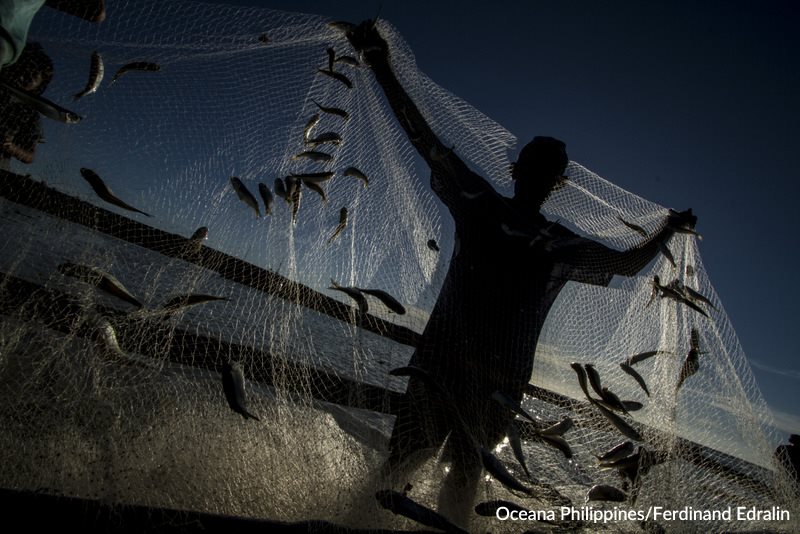Oceana, fisherfolk oppose Marcos' call to change Fisheries Code

Advocacy group Oceana Philippines and fisherfolk groups on Wednesday expressed alarm over President Ferdinand Marcos Jr.’s call to revise the Fisheries Code, saying such change could decimate the fishing areas for people in the countryside.
The groups issued the statement in response to Marcos saying in his second State of the Nation Address last Monday that the Fisheries Code “must be revised to incorporate and strengthen science-based analysis and determination of fishing areas.”
“The Fisheries Management Area (FMA) system under the Fisheries Code already provides a science-based, participatory, and transparent mechanism to sustainably manage our fisheries. The law is clear about the state’s policy: adopting the precautionary principle and management of fishery and aquatic resources through the ecosystem-based approach and integrated coastal management through the FMA system,” lawyer Rose Liza Eisma-Osorio, legal and policy specialist of Oceana Philippines, said in a statement.
“Contrary to the President’s pronouncement in his SONA, the Philippine Fisheries Code or Republic Act 10654 does not need to be amended. We must first comprehensively and fully implement key reforms that were introduced by RA 10654,” she added.
Osorio said key reforms already provided under the law include science-based, ecosystem approach in managing the country's depleting fishing grounds through Fisheries Management Areas as well as implementation of transparency measures critical in combating illegal, unreported and unregulated (IUU) fishing, specifically the installation of vessel monitoring measures (VMM) on commercial fishing vessels and electronic reporting system (ERS) of fish catch that should be publicly accessible.
“We must ensure that all these measures are fully implemented to address the worsening conditions of our fisheries,” Osorio added.
Ruperto Aleroza, vice chairman of the state-run National Anti-Poverty Commission (NAPC) unit for Basic Sectors, for his part, said he has received reports that amendments to Fisheries Code would mean opening municipal waters to commercial fishing activities when such waters should be reserved for the fisherfolks from the countryside.
“Narinig na namin ang panukala mula sa komersyal na pangisdaan na gusto nilang pumasok sa municipal water na pangunahing nakalaan para sa mga municipal at artisanong mangingisda. Hindi kami papayag na agawin nila ito dahil malinaw ang nakasaad sa ating Saligang Batas,” Aleroza said.
(We heard the proposal from the commercial fisheries sector that they want to enter municipal waters which are primarily reserved for municipal and artisanal fishermen. We will not allow them to steal our waters because our Constitution is clear on this.)
Aleroza then said that protecting municipal waters from commercial projects is not being selfish, but for the common good.
“Hindi ito pagmamaramot sa kanila. Ito ay pagtitiyak na ang mga pangitlugan at tirahan ng mga maliliit na isda sa mga municipal water ay hahayaang lumaki upang manganak ng mas marami pang isda. Bakit hindi ito maintindihan ng komersyal at ng pamahalaan?” he pointed out.
(We are not depriving them of fish catch. We are just making sure that the breeding ground and home of fish catch in municipal wsters will thrive and enable the fish to breed more of their kind. What is so hard to understand about that?)
Opening municipal waters for commercial fishing, Aleroza said, disregards the 1987 Constitution which provides for preferential rights of subsistence fisherfolk to the use of local marine and fishing resources in municipal waters and of the government’s duty to protect the nation’s marine wealth, with the priority of subsistence of fishermen.
“The proposed amendment is short of the foresight needed to stop the further depletion of major fishing grounds inside municipal waters. This alarming development can affect all fishing sectors – both municipal and commercial,” the groups added in a joint statement.
Oceana is the largest international advocacy organization dedicated to ocean conservation and is engaged in rebuilding abundant and biodiverse oceans via science-based policies in countries that control one-quarter of the world’s wild fish catch. —KG, GMA Integrated News



